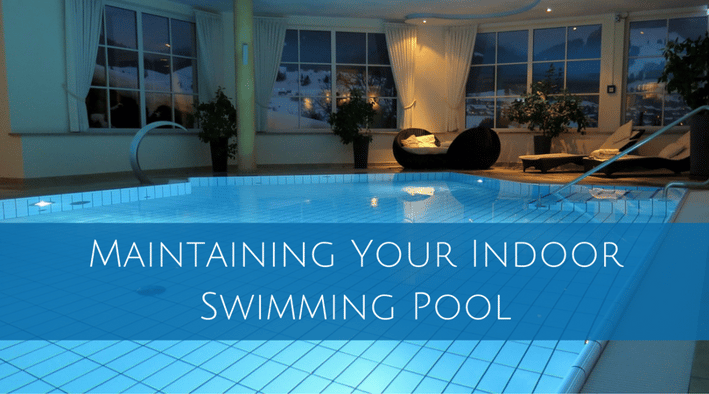
Indoor swimming pools allow for year-round use regardless of weather conditions. Hotels, condominiums, apartment communities and health clubs often have an indoor commercial pool that are heavily used by guests. An indoor commercial swimming pool may be open for use 12 or more hours each day. Frequent use means extra maintenance and watching for swimming pool leaks.
Here are some things to be aware of when maintaining an indoor pool.
An enclosed area will contain the commercial swimming pool. The unpleasant odors often associated with indoor pools come from poor ventilation that allows the build-up of waste odors, including nitrogen, other chemicals and body odors. Body oils, powders, and perfume can affect water quality and create waste odors even though swimmers are encouraged to shower before entering the pool area. Fans and a good ventilation system are required for health clubs and other indoor commercial pools to control air quality and humidity.
The pH balance or acid-alkaline balance of the water must be checked several times a day to keep the water clean and fresh. This is necessary for spa tubs as well. Many indoor pools must be "shocked" with extra chlorine to keep the water and air in the room fresh. The smell of chlorine is not bad since it indicates that the pool is clean.
Pool and spa covers are important for keeping pools clean when they are not in use. But mold and other pathogens can grow under the covers from excessive heat and moisture when an indoor pool is covered. Chemical odors also build up. A private indoor pool or spa should be left uncovered for several hours and even shocked with extra chlorine.
An indoor commercial swimming pool at a health club or community center will have more use than a private pool. These pools often have a bather limit. Adults and children who sit along the side of the pool and dangle their feet in the water are still considered bathers. The more people in the pool, the more stress on the system.
The pool should be cleaned and vacuumed frequently. The sides and bottom of the pool below the water line must be kept clean in a commercial swimming pool.
Overflow gutters must be checked for small items such as rubber bands and small pieces of jewelry. Kids can forget to remove ribbons and hair bands. Straps from goggles and fins may float into the overflow gutter. These items can get stuck in the skimmer or filter.
The filter systems need to be checked frequently since small items and dirt can find their way into the skimmer and intake lines. Backwashing may be necessary and special chemicals may be needed to remove body oils, grease, and gasses from the filter.
Fittings for handrails and steps should be tight. Drains must always be tight. Tiles must also be checked. Any loose tiles or fittings could result in pool leaks. Excessive water on the decking can be the sign of a plumbing leak. It may be difficult to limit splashing, but an extremely low water level is often the sign of a leak.
Related Post: 10 Quick Tips to Prevent Commercial Pool Leaks
Call in Aquaman Leak Detection for fast pool repairs so you can limit downtime for your guests or members. Aquaman serves all of Florida with expert service using the latest high-tech equipment to find and repair leaks.

With over 20 years of reputable experience finding leaks, owner Lowell Ball created a unique and patented leak detection system that accurately finds leaks without damaging property. We are so confident in our system and our workmanship, we offer the strongest warranty in the industry.
Aquaman Leak Detection Corporate
1275 South Patrick Dr, Suite A6
Satellite Beach, FL 32937
Owner Direct: 321.431.4784
844.766.5532 (844 POOL LEAK)
info@aquamanleakdetection.com
Office Hours:
9AM-6PM Mon-Fri
Emergency Service Available 24/7
Blog Comments